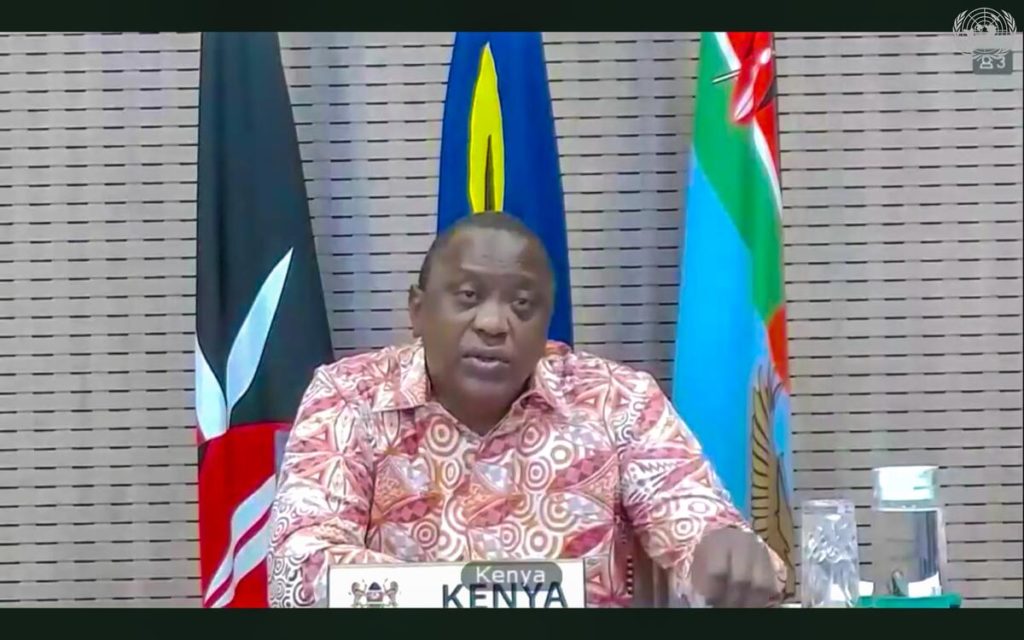UN Environment Assembly concludes with an urgent call for action to solve planetary emergencies
NAIROBI, Feb 24- Ministers of environment and other leaders from more than 150 nations on Tuesday concluded a two-day online meeting of the United Nations Environment Assembly with a warning that the world could face new pandemics if it does not safeguard nature.
In a press release issued Tuesday, the United Nations Environment Programme (UNEP) quoted Kenyan President Uhuru Kenyatta saying: “It is increasingly evident that environmental crises are part of the journey ahead. Wildfires, hurricanes, high temperature records, unprecedented winter chills, plagues of locusts, floods and droughts, have become so common place that they do not always make the headlines.”

Photo courtesy of UN Photo/Eskinder Debebe
In his remarks at the Assembly, he said that the increasing adverse weather and climatic occurrences were warning bells calling on the world to attend to the three planetary crises that threaten the future: the climate crisis, the biodiversity and nature crisis, and the pollution and waste crisis.
The UN Environment Assembly meets biennially to set priorities for global environmental policies and develop international environmental law; decisions and resolutions then taken by Member States at the Assembly also define the work of the UNEP.
Attended by thousands of online participants, including more than 1,500 delegates from 153 UN Member States and over 60 Ministers of the Environment, the Assembly – which was broadcast live – also agreed on key aspects of UNEP’s work, kicked off the commemoration of UNEP’s 50th anniversary and held leadership dialogues where Member States addressed how to build a resilient and inclusive post-pandemic world.
At the Assembly, member states reaffirmed UNEP’s mandate as the leading global environmental authority and called for greater and more inclusive multilateralism to tackle the environmental challenges.
In their statement, they also said that collective action will be essential to successfully address global challenges, adding that human health and wellbeing were dependent upon nature and the solutions it provides.
“We are aware that we shall face recurring risks of future pandemics if we maintain our current unsustainable patterns in our interactions with nature.”
Sveinung Rotevatn, President of UNEA-5 and Norway’s Minister for Climate and Environment, echoed the warning.
“Everyone gathered at the Environment Assembly today are deeply concerned about how the pandemic causes new and serious health, socio-economic and environmental challenges, and exacerbates existing ones, all over the world,” he told a press conference on the closing day of UNEA-5.
“We shall work together to identify actions which can help us address climate change, protect biodiversity, and reduce pollution, at the same time,” he added.
The Assembly agreed to a new Medium-Term Strategy, Programme of Work and budget for UNEP. The new Strategy – which will take UNEP from 2022-2025 – sets out a vision for UNEP’s role in delivering the promises of the 2030 Agenda.
“The strategy is about transforming how UNEP operates and engages with Member States, UN agencies, the private sector, civil society and youth groups, so we can go harder, faster, stronger,” said Ms. Inger Andersen, UNEP ‘s Executive Director. “This strategy is about providing science and know-how to governments. The strategy is also about collective, whole-of-society action – moving us outside ministries of environment to drive action.”
In the run-up to the Assembly, UNEP launched a major report, together with UN Secretary-General António Guterres – Making Peace with Nature – which provides a comprehensive blueprint for solving the triple planetary emergencies of climate change, biodiversity and pollution.